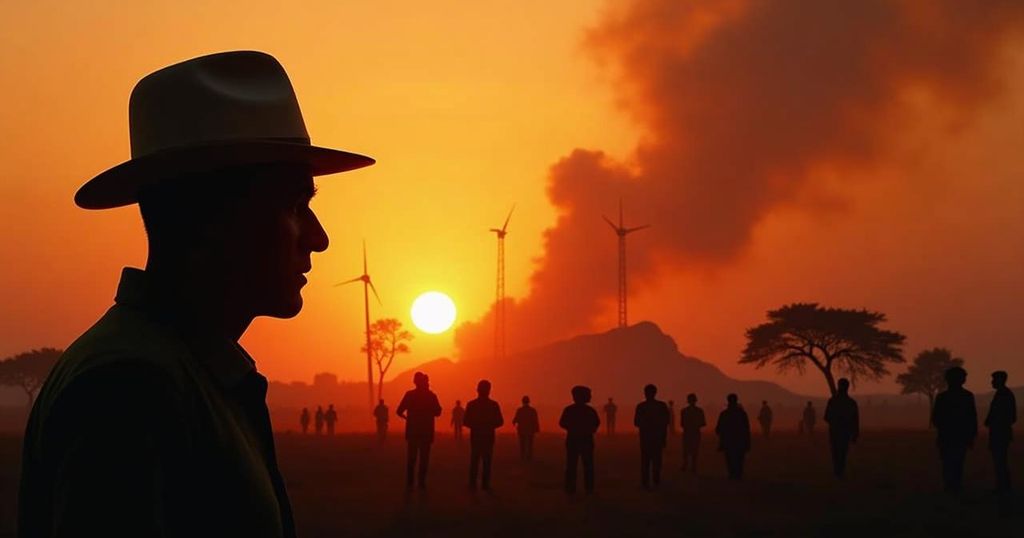RSF Leader Accuses Egypt of Military Intervention in Sudan Conflict

On October 9, 2024, RSF leader Mohamed Hamdan Dagalo, known as Hemetti, accused Egypt of military intervention in Sudan’s conflict, pledging to mobilize one million fighters in response. He acknowledged defeats due to Egyptian airstrikes and indicated the involvement of foreign mercenaries by the Sudanese army, escalating tensions in the region.
On October 9, 2024, the leader of Sudan’s Rapid Support Forces (RSF), Mohamed Hamdan Dagalo, commonly referred to as Hemetti, made significant allegations against Egypt, claiming that it has engaged in direct military intervention within the context of Sudan’s ongoing conflict. In a video address disseminated via RSF channels, Hemetti asserted that Egypt has been involved in military operations backing the Sudanese army, which he deemed a direct affront to his forces. Hemetti also revealed a planned escalation in response to Egypt’s actions, declaring intentions to mobilize one million fighters and enact what he labeled as “Plan B.” He acknowledged that his troops had recently faced setbacks, particularly in Jabal Moya, where they endured extensive aerial bombardments purportedly by Egyptian forces utilizing warplanes and drones during critical engagements. On October 5, the Sudanese army had successfully reclaimed control of the Jabal Moya mountain range, a strategically vital area linking several states in Sudan. In his statements, Hemetti voiced profound grievances regarding the aerial assaults they experienced, recounting, “We were defeated at Jabal Moya in Sennar state by treacherous Egyptian airstrikes.” He criticized the Sudanese army’s reliance on foreign mercenaries and accused them of engaging combatants from various nations, including Ukraine and Azerbaijan, to combat against RSF. Adding to the gravity of his accusations, Hemetti charged that during negotiations in Geneva, Egypt supplied the Sudanese army with military aircraft and munitions, enhancing their operational capabilities against the RSF. He lamented the ongoing humanitarian crisis resulting from persistent air raids affecting civilian populations in various regions, suggesting a possible ethnically driven motivation behind the targeted attacks. In light of allegations surrounding criminal activities associated with RSF, Hemetti distanced himself from these claims, stating, “We are not associated with them.” He urged his forces to maintain discipline during engagements and instructed soldiers on leave to return and reinforce their ranks. Furthermore, he reiterated his critique towards the Islamic Movement leaders, claiming they orchestrated the ongoing conflict to regain power, stating that they “overthrew us and attacked us while we were asleep.” Hemetti’s declarations mark a pivotal escalation in the ongoing strife within Sudan, with implications for regional security given the alleged foreign interventions.
The current situation in Sudan’s conflict emerges against a backdrop of military confrontations between the RSF and the Sudanese army, intensified by regional dynamics involving other nations. The RSF, initially formed as a paramilitary group, has been challenged by the conventional military’s resurgence, especially in strategically important locations such as Jabal Moya. Egypt’s alleged involvement complicates the conflict, raising concerns about broader regional influences, including claims of support from other states and non-state actors. Hemetti’s accusations expose the fragile nature of military alignments in the region and signal a potential escalation as he mobilizes his forces in response to perceived threats from both domestic and international actors.
The statements made by RSF leader Mohamed Hamdan Dagalo illustrate the intricacies of the current Sudanese conflict, emphasizing foreign involvement and the escalating tensions between the RSF and the Sudanese army. With Hemetti’s call to arms and plans for a larger mobilization, the conflicts in Sudan risk further intensification, potentially drawing in more foreign entities and exacerbating regional instability. As the situation develops, the ramifications of external interventions and internal disputes will likely shape the future landscape of Sudan’s military struggle.
Original Source: sudantribune.com






